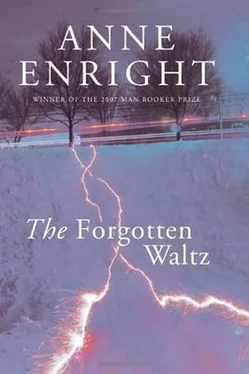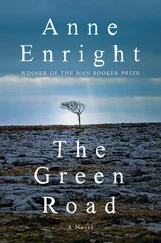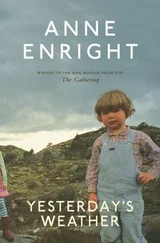I had too much wine, myself, the night after she died. After the undertaker, the phone calls and arrangements, I cracked open a Loire white, and drank it at speed, and I felt two things. The first thing I felt was nothing at all. The other thing I felt was an emotion so fake and slick I wanted rid of it. It was such a lie. There he was – my father. Not in a stranger, but in me, as I sat on my own in a straight-backed chair at the kitchen table, pausing to apologise to the wine when it slopped out of the glass.
I threw the perfume bottles away; these woody, elegant scents my mother chose to complement the smell of her cigarette smoke and her occasional night on the vodka. You might think I would want to hold on to these last moving molecules, but I did not. I wanted to open the windows, bash the upholstery, and chase the smell of her death away; the butts I found in the garden ashtray floating in rainwater, the yellow tinge on the ceilings, the cloying old glamour of Je Reviens.
Seán came to the funeral. I didn’t mind. It should have been a tactless thing to do, but it wasn’t. It seemed to come from some hidden rhythm in our lives; a better place. He came up in the church porch and gave me a hug. Seán looks like someone too busy to care, but then something happens and he does it all perfectly. The country manners coming out in him, maybe, or the bank manager father, who knew the line between doing something sincerely and doing it well. Seán did it well. The only public gesture between us. The only ritual act of touching: hand on my shoulder, hand to the centre of my back, a one-armed hug, his face in my hair, ‘Poor you,’ he said. ‘Poor Gina.’ And did not pause to look into my wrecked eyes, or to feed on the sorrow in my face, but went over to hug Fiona, and then walked away. The whole sequence perfectly timed and true to what we had become; old comrades in the war of love.
My eyes were fine, as it happened. My sister’s also. We are, neither of us, the crying type. We are the sunglasses type. We are the kind of woman who walks out of a funeral service talking about their foundation.
‘Is there a line?’ I said to Fiona, indicating the underside of my chin. Said it, and meant it. And Fiona, who understood completely, said, ‘Tiny bit. Just there. You’re fine.’
So my make-up was, at least, properly blended, as they loaded my mother’s coffin into the hearse and Seán paid his respects in the May sunshine. I looked after him as he walked away – you might even say he trotted – a busy little shortarse in a pale summer suit, his arm up for a taxi as soon as he hit the side of the road.
Then I hugged the next person.
I can’t talk about Conor at the funeral. He was great. Conor is great, anyone could tell you that. He did everything right. Except, I suppose, for the way he checked his damn phone every five minutes.
‘Don’t tell me that thing is online,’ I said.
‘Duh!’ he said. Then he looked up at me and stalled, realising where he was.
He was wearing his black suit – too tight on him, now – his only suit, the one he had been married in. Same church, same porch, a little later in the year; the fallen cherry blossom now drifted against the steps and turning brown.
SEÁN RANG, SOME weeks later, to ‘check that I was OK’, I said I was really not OK, and I laughed. He said he knew a good guy if we wanted help selling the house.
‘If you are selling the house.’
‘Well, you know,’ I said. I did not tell him that I was sleeping in the place, or sleeping there some days, during the afternoon. As I said, you would think the rooms might have faded, but all her things were just as she liked them. And when I came back, one day – another day, that Fiona could not manage – I put my feet up on the sofa for a moment, and woke just as dark was starting to fall.
‘What’s up with you?’ I said.
‘Nothing’s up.’
‘Are you in the dogbox?’ I said, because that’s how he used to talk about his marriage, he always used to say, ‘I’m in the dogbox at home.’
‘No, it’s not that,’ he said. But it was something.
In the old days – the good old days, when we seldom saw each other dressed – Seán did not discuss his daughter. She might crop up towards the end of the afternoon, just as he was getting ready to go. One day he said, ‘Evie wants a ferret. Can you believe it?’ Another time, going through his pockets for keys, he said, ‘A lump of Evie’s hair fell out, have you ever seen that? About the size of an old two-pence, about this wide.’
He said this sometime in the spring. I know when it was because I remember thinking, quite casually, ‘We did that.’ It was our kiss on New Year’s Eve that did this thing to Evie’s hair.
The calls he made after Joan died were different. He rang as a friend, and he talked about his daughter, the way you do.
Evie was fighting with her mother. Evie threw a pair of shoes under the wheels of a lorry because she wanted to wear high heels. Evie was so spacey, she was always late. Her schoolwork was going to pot, she couldn’t concentrate for two minutes at a time. I tried to figure out if my niece, Megan, had started her periods yet. I said, ‘Is she eating?’
‘Eating?’ he said.
‘Like, food.’
‘She eats,’ he said, though he seemed to disapprove of the question.
‘What age is she again?’
‘Ten.’
‘That’s a bit early all right.’
I told him we thought Fiona had anorexia when she was sixteen and this interested him a lot.
‘We brought her to a doctor. Have you brought Evie to a doctor?’
‘For what, though?’ he said. ‘I mean, what would you say?’
It was a thing we started to do, whenever I was over in Terenure – twice, maybe three times in the next couple of months – I sent him a text, and he would call. I slept on the sofa another time, and we talked when I woke. The third time (it was a bit like going back on the cigarettes, actually) I rang as soon as I got in the door, and we had these dreamy, walking chats, where he led me, through this and that, to his troublesome daughter, and I moved through my mother’s rooms, and touched the objects she had left behind. And I don’t know if Evie was the reason or the excuse, the day he said – maybe that day, the day of the third call:
‘Where are you? Are you there now? I’m just down the road.’
Which is how we ended up making love, not in my old room, but in the bedroom beside it. I opened the front door and he was there, all clear grey eyes in front of a troubled grey sky. I showed him into the house.
‘Funny,’ he said.
‘What?’
‘I thought it would be bigger.’
‘It is quite big,’ I said.
We went upstairs.
‘Sure,’ he said. ‘I mean this is a very desirable sort of house.’
He glanced inside the bedrooms, checked out the en-suite, the spare room, the upstairs bathroom.
‘Two and a bit?’ he said.
And then he hugged me, because I was trembling. I fended him off at the door to my parents’ room and at the one that led to my own childhood bed. We went to the place of least resistance. At least I think so. I think we fell through the door that felt right.
And were, of course, found out.
Seán had come into the house with some papers in his hand and he left them on the shelf in the hall where the post gets left, and a few days later Fiona discovered, among the letters there, several addressed to him, their envelopes ripped open, including one that contained – she could not help but notice – a cheque for four-hundred-and-fifty euro. She put them in her car and drove them home on the front seat beside her, and she was about to pull into his driveway and hand them in at his door when she realised that she could not do this. She thought about pushing them through the letterbox and decided against this also. She dialled my number and said, ‘I can’t believe you did this to me.’
Читать дальше












